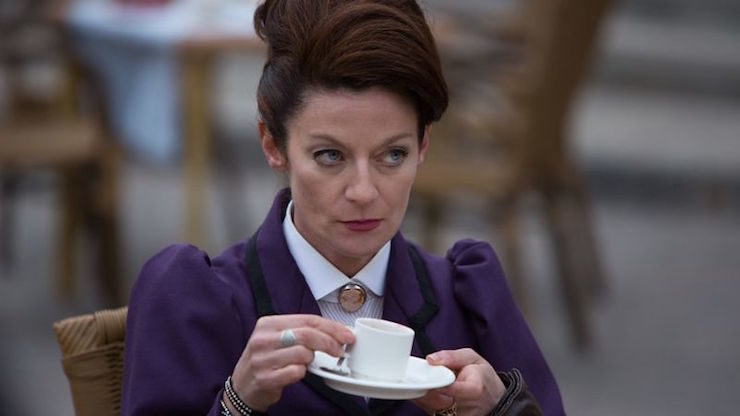At least since Tom Baker left the starring role of Doctor Who back in 1981, fans have wondered if the time-traveling eccentric could ever become a woman. And the show’s producers, over the years, have enjoyed trolling the fans by hinting that it might be possible this time, or by making extreme statements about why the Doctor must always be a bloke. (And then there’s Joanna Lumley…)
But meanwhile, for the past few years, one of Doctor Who’s most important characters, the Master, has been female-bodied. As fans know, she now goes by Missy, and as played by Michelle Gomez, she’s like Mary Poppins crossed with the Joker. And this year’s series has turned out to revolve around Missy, and whether she’s finally on her way to becoming a good person.
And I have to say, I vastly prefer Missy when she’s being bad.
Spoilers for recent episodes follow…
The main reason to enjoy Doctor Who season 10, without question, has been Bill (Pearl Mackie), the new companion who’s brought a wonderful snark and curiosity to the role. At first, the Doctor and Bill had a lovely Educating Rita dynamic, as the Doctor takes her on as his student at St. Luke’s University. Bill has helped bring a new energy to the venerable show, and she powered the season’s best episode, “Thin Ice.”
But this season’s slow-burn arc involves Missy, who has been locked in a vault in the basement of a university on Earth for decades. (It’s become a motif of Doctor Who in recent years that decades or even centuries pass, largely offscreen, for these nigh-immortal characters.) It turns out the Doctor was supposed to execute Missy on some alien planet, but rescued her instead, because she pled for clemency and he believes she can change. Ever since then, the Doctor has kept her locked up, and has been guarding her with his life. Except when he gets bored.
(Does the Doctor still remember the thing where Missy nearly tricked him into murdering his companion Clara, by trapping Clara inside a Dalek? Or was that wiped along with his other memories of Clara? We’ll probably never know.)
The business of the Doctor keeping Missy in a vault has suffered a bit from too much build-up, not enough story. We didn’t actually see much of Missy until halfway through the season, and since then it’s been full speed ahead on the question of her redemption. Meanwhile, only the Doctor’s friend Nardole seems to take the responsibility to guard Missy seriously—probably because Nardole will be the first to die if she gets free.
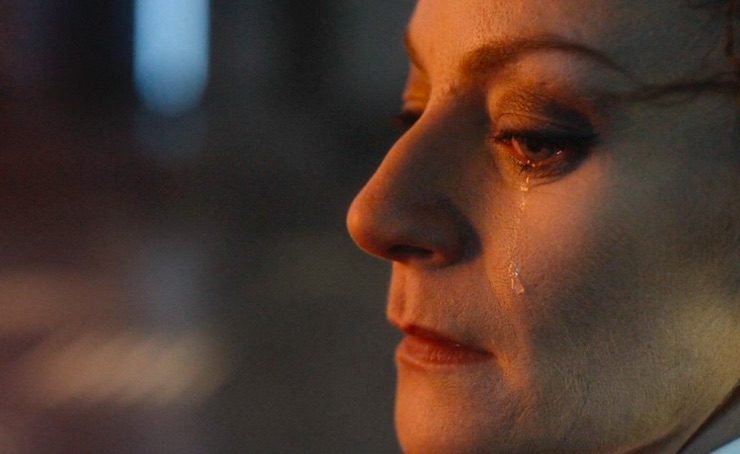
The key signposts of Missy’s redemption arc have been her tears, as well as some scenes where she talks about remorse for all the countless people she’s murdered. Plus, when the Doctor chooses to spare her life on the executioner planet, she asks him to teach her to be good, and maybe he’s been doing that offscreen. (She also rescues the Doctor from Mars in “Empress of Mars”, but she’s rescued the Doctor countless times before, including in last season’s Dalek two-parter.)
Meanwhile, though, there are reasons for doubt. Missy is still willing to sacrifice Bill’s life to put an end to another alien invasion, the threat this time coming from monks who created a virtual-reality version of Earth, and then ruled the real world for six months by means of love and historical revisionism (don’t ask.) Missy even gets in one of her best jabs at the Doctor, telling him that his version of “good” is vain and arrogant.
The question of the Master’s redemption is one that has popped up quite a bit over the long history of the character. The very first time we meet the Master, he switches sides to help the Doctor save the world from the Autons, and the fractured friendship between the two has always been a major focus of the show. Many fans already know that the Third Doctor’s era was supposed to end, not with Buddhism and giant spiders, but with the Master sacrificing his life to save the Doctor once and for all.
But there’s always been a somewhat clear distinction between the Master’s fondness for the Doctor (which borders on obsession) and the evil Time Lord’s inability to change. Russell T. Davies muddied the waters by introducing a new backstory in which the Time Lords had turned the young Master evil on purpose, so he could save them during the Time War—making the Master’s crimes, in some sense, not his fault. For his part, the Doctor has always seemed to be convinced that his arch-nemesis can never really change. Notably, in 1984’s “Planet of Fire,” the Doctor watches the Master plead for his life…and then just lets him die.
One of the most interesting Master stories is the 2013 novel Harvest of Time by Alastair Reynolds, in which, among other things, we meet countless potential incarnations of the Master, including men, women, and aliens. (Spoilers for Harvest of Time follow, sorry.)
At one point, the Third Doctor and the Master are taken outside of time, and suddenly the Master is free of his madness. He tries to convince the Doctor that he finally has the potential to be a good person…and the Doctor refuses to believe that this is anything but another ruse. The Master warns that if the Doctor returns them to normal time/space, he’ll become evil once again, and the Doctor will be, in essence, destroying him. On his knees, the Master begs, “We were friends once. Let me live. Don’t make me become that thing again.” But the Doctor just says, “It was a nice try,” and then restores them to normal space/time. Soon, the Master is exulting that he’s been freed once again from his pathetic weakness, and the Doctor realizes he’s made “the gravest error in judgement in all his years.”
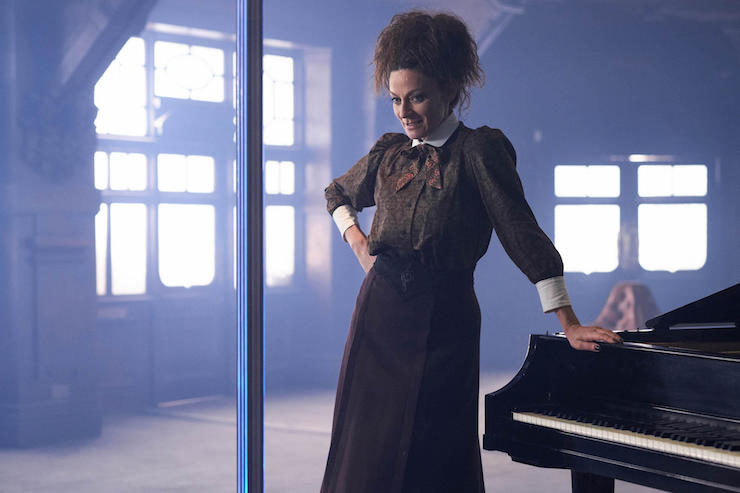
As for the current storyline, I get that the Twelfth Doctor still wants to save his old friend, and that he’ll clutch at any hint that Missy might have changed—but at this point in the season, Doctor Who hasn’t shown me any reason to believe in Missy’s change of hearts. And I think we’re supposed to have at least some hope that she’s miraculously reformed.
It doesn’t help that we already went down this road last season with the Daleks’ creator Davros, who claimed at great length to be having a crisis of conscience—and then turned out to be just as unrepentant as you’d expect. (After all, Davros is a fascist mad scientist, clearly based on Josef Mengele, who experimented on countless innocent people and then unleashed an army that he knew would slaughter billions.)
Missy’s redemption will probably turn out to be just as illusory as Davros’, but we’ll find out soon enough. I’m more concerned, right now, with the way her redemption has been sold thus far. The set-up for the season-ending two-parter relies entirely on the audience at least believing that Missy may have changed—otherwise, our suspense is literally limited to just, “What evil scheme is she pulling this time?”
The final scene of this past weekend’s otherwise-good episode, “The Eaters of Light,” leans on a dramatic arc for Missy that the show has in no way earned. We see Missy listening to Celtic music and weeping, and she says that she doesn’t know why she keeps crying nowadays. Then the Doctor acknowledges that it’s probably just another devious scheme… but he can’t resist the hope that it’s real, and he can have his friend back. “That’s the trouble with hope. It’s hard to resist.” Then Missy cries some more. We already know from the “next episode” teasers that John Simm is coming back, as Missy’s utterly remorseless previous incarnation—and most likely, he’s either going to derail her redemption, or help her spring some trap.
So I’m just going to say it: We probably wouldn’t be spending this much time watching Missy cry and being told to wonder if she’s really changed if the Doctor’s arch-nemesis were still a man. Missy’s female body seems to be the main reason why this is even a dramatic point, as far as I can tell. Her tears, her insistence that her conscience is tormenting her, rely almost entirely on Michelle Gomez’s use of notes of feminine vulnerability and softness—like when she acts bashful after the Doctor says this is probably just another scheme. And meanwhile, there’s no question that Missy is a much better character when she’s indulging in total irresistible evil.
Gomez’s turn as Missy has been one of the best things about Doctor Who in recent years, and it’s been a joy to see this classic supervillain take on such a colorful, unpredictable persona. While the old Master occasionally busted out with a Scissor Sisters dance routine, Missy has torn through every scene, punching up the role of antagonist with a series of completely outrageous acts like her flirty murder of Osgood and the aforementioned death trap for Clara.
Apart from anything else, Gomez has proved conclusively that a female Doctor wouldn’t just be as good as any of the male versions—with the right actor, in many respects, she would be even better.
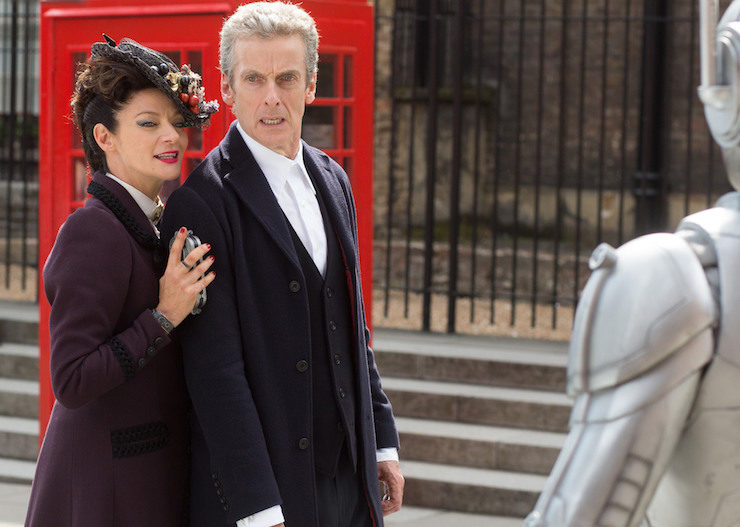
Missy starts out as a version of River Song—another sexually aggressive older woman with a complicated past—and in her very first scene with Peter Capaldi’s Doctor, she kisses him so hard that he’s stunned for a few minutes afterwards. But her sadism, her willingness to use the “little girl” voice right before doing something unspeakable, the louche decadence she infuses into her contempt for human life… her whole performance has become something more distinctive and startling.
Introducing Missy as a female version of the Master, from the beginning, was a way to take the latent sexual tension in the tortured Doctor-Master bromance and bring it to the surface. (Writer Steven Moffat notably stuck a joke into the “Time Crash” mini-episode about the Master’s abused wife, Lucy Saxon, being his “beard.”) Missy doesn’t just French kiss the Doctor, she macks on him constantly, and Gomez’s body language towards Capaldi is positively filthy at times.
All of which makes the stuff about the Doctor and Missy having a broken friendship—which is what drives Missy to create a Cyber-zombie-army to prove they’re not so different, and the Doctor to give her his “confession dial”—much more interesting. Even this week’s scene, where the Doctor says maybe they can be friends again, is played as if they’re ex-lovers: Gomez lunges towards Capaldi and he backs away, but then he takes her hands in his own and looks at her tenderly.
But Missy is much more interesting as a lit stick of dynamite than as a damp squib. No scene with her this season has been as electrifying as the moment in season nine where Clara asks if they’re supposed to believe that Missy’s turned good. And Missy is so affronted by the very notion, she incinerates a UNIT soldier in cold blood, before remarking that he seemed to be married, maybe with kids. Missy’s most fun when she’s cackling, dancing, wreaking havoc, piling up a huge body count.
I love a good redemption arc—but it’s a tough thing to earn. The worse the crimes, the higher the threshold. Among the many things I admire about Agents of S.H.I.E.L.D., the show’s crown jewel is its handling of Grant Ward, who betrays his friends for the Nazis and is never once forgiven. (Even when we meet an alternate Grant Ward who’s made different choices, it’s more of an object lesson, not a sign that the real Grant deserved easy redemption.)
There’s almost no question that this season will end with Missy (or the Master, if she goes back to being a bloke) going firmly back to the side of evil. You have to put the toys back into the box, after all, and the Doctor always needs a dark reflection. I just hope before the storyline wraps up, we get to see more of Missy at her best—and by that, I mean her worst.
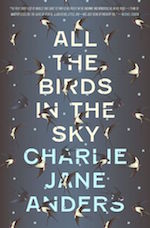 Before writing fiction full-time, Charlie Jane Anders was for many years an editor of the extraordinarily popular science fiction and fantasy site io9.com. Her debut novel, the mainstream Choir Boy, won the 2006 Lambda Literary Award and was shortlisted for the Edmund White Award. Her Tor.com story “Six Months, Three Days” won the 2013 Hugo Award and was optioned for television. Her debut SFF novel All the Birds in the Sky, recently won the 2016 Nebula Award in the Novel category and earned praise from, among others, Michael Chabon, Lev Grossman, and Karen Joy Fowler. She has also had fiction published by McSweeney’s, Lightspeed, and ZYZZYVA. Her journalism has appeared in Salon, the Wall Street Journal, Mother Jones, and many other outlets.
Before writing fiction full-time, Charlie Jane Anders was for many years an editor of the extraordinarily popular science fiction and fantasy site io9.com. Her debut novel, the mainstream Choir Boy, won the 2006 Lambda Literary Award and was shortlisted for the Edmund White Award. Her Tor.com story “Six Months, Three Days” won the 2013 Hugo Award and was optioned for television. Her debut SFF novel All the Birds in the Sky, recently won the 2016 Nebula Award in the Novel category and earned praise from, among others, Michael Chabon, Lev Grossman, and Karen Joy Fowler. She has also had fiction published by McSweeney’s, Lightspeed, and ZYZZYVA. Her journalism has appeared in Salon, the Wall Street Journal, Mother Jones, and many other outlets.










